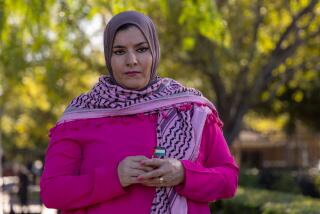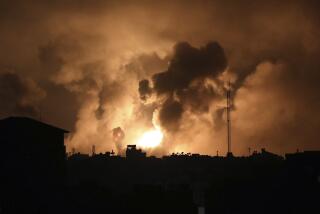Cartoon of Prophet Inflames Arab World
- Share via
CAIRO — Pigs are regarded as unclean and offensive by both Muslims and Jews. So when a young Israeli pasted posters around the West Bank city of Hebron that portrayed the prophet Muhammad as a bulbous, headdress-wearing pig writing the Koran with a cloven hoof, she provoked outrage not only in that mostly Palestinian city but also among Muslims across the Arab world.
In a traditional society such as Egypt, where public sacrilege against the prophet is unimaginable, the drawing led the country’s highest Islamic cleric to declare that the insult to Islam ought to be punished by death.
One Cairo newspaper labeled it “the worst crime in the history of the Zionists’ envy of Islam.” Several commentators said the caricature amounted to a declaration of war against Islam.
Reaction on the street here was especially vehement. “After seeing that picture, if there was an Israeli standing in front of me, I would have killed him,” fumed Eid Hussein Hassan, a Cairo shopkeeper, in a typical comment. “I am praying to God that a war starts with Israel. . . . It does not matter if I live or die, so long as I am fighting for the Koran and my religion.”
The caricature, which has been denounced in mosques across the Middle East, was reproduced on the front pages of newspapers and in Arab television news broadcasts.
Arab cartoonists habitually portray Israel and Israelis in offensive and insensitive ways: with hooked noses or swastika-bedecked Nazi uniforms, for example.
In Tehran, the Iranian Foreign Ministry called the image a “Zionist insult to the sanctities of world Muslims.” The parliament in Kuwait urged “a tough stand” by the international community against “Zionist practices that hurt the feelings of Muslims all over the world.”
Israeli Prime Minister Benjamin Netanyahu apologized to the Palestinian mayor of Hebron, Mustafa Natshe, for the offensive drawing. “This is shocking and goes against our ideals as Jews and the respect we have for the religion of Islam,” Netanyahu told the mayor.
Israeli President Ezer Weizman also issued an apology for the cartoon, which has been criticized by others in Israel as well. And in Washington on Wednesday, State Department spokesman Nicholas Burns said: “It’s offensive to every American. It has to be. It’s offensive to our government.”
A Russian emigre and former art student living in Jerusalem, Tatiana Suskin, 25, has reportedly admitted that she drew the picture and pasted it on shops and walls, and reportedly said she considers it justified because of recent violent protests by Palestinians against Israel.
“This is my reaction to the Arab behavior in Hebron,” she said in court earlier this week, according to Israeli press accounts. “If their religion allows them to behave like this, then it really is a pig.”
*
Suskin was arrested by Israeli police, partly for her own protection, pending a formal indictment expected today.
But her incarceration and the swift apologies from Israel’s highest authorities have done little to allay the indignant emotions swelling across the Arab world.
Mohammed Sayed Tantawi, sheik of the Al Azhar mosque in Cairo--Egypt’s highest Muslim cleric and one of the world’s leading Sunni Muslim theologians--said a person who drew such a picture should die, because an insult to the prophet is “an insult to all Islam.”
Tantawi, considered a moderate, told the newspaper Al Akhbar that “anyone who ridicules or insults the prophet is punishable by killing,” if the insult is intentional and not recanted.
More than 1 billion Muslims worldwide regard Muhammad, who died in 632, as God’s messenger and believe that God’s holy word, the Koran, was revealed to him in a series of visits from the archangel Gabriel.
*
Although not considered divine, Muhammad is loved and revered by Muslims as God’s chosen envoy to mankind and as the temporal leader who formed the first Islamic state.
Many in Cairo discounted Arab offenses against Jewish sentiments while trumpeting their own current grievances. “This picture is worse than killing Palestinians,” said taxi driver Baioumi Kamel.
“The problem between [Israelis] and the Palestinians is a matter of land and the law. But a picture like this offends all Muslims, whether Arabs or not,” Kamel said.
The real harm in the drawing may be that it will contribute to a permanent hardening of attitudes toward Israel in neighboring Arab lands, said one leading Egyptian intellectual. Such incidents “reflect growing tension, hatred and fanaticism,” said Abdul Moneim Saed, director of the Al Ahram Center for Strategic Studies.
“I don’t think this alone will have a long-term effect,” he said. “But it is the accumulation of bitterness that augments the tense situation that we have.”
More to Read
Sign up for Essential California
The most important California stories and recommendations in your inbox every morning.
You may occasionally receive promotional content from the Los Angeles Times.













